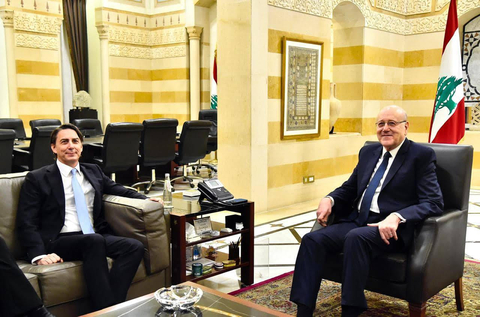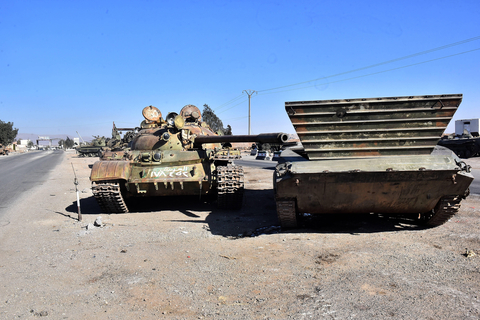Lebanon’s Presidential Crossroads: Signs of a Post-Hezbollah Era?

IMAGO / APAimages
Lebanon is once again confronting a prolonged presidential vacancy, underscoring a pattern that has repeatedly disrupted its political landscape. The country has failed to elect a new head of state since October 31, 2022—when Michel Aoun’s term concluded–the president has to be a Maronite Christian. This vacancy is the fourth of its kind in modern Lebanese history, shining a light on the entrenched deadlock that arises whenever political factions cannot reach a consensus. Notably, Aoun had previously led a military government in 1988, and thus, his departure in 2022 concluded his second significant foray into power. Despite multiple parliamentary sessions since then, deep political divides and strict constitutional requirements—including the need for a two-thirds majority in the initial round of voting—have stymied the election process.
A Recurring Void in Lebanon’s Leadership
Lebanon’s presidency has historically been subject to prolonged vacancies, and the current stalemate is part of a more significant trend. In 2005, when the Syrian army withdrew from Lebanon, the country’s delicate confessional balance shifted. Various power centers, especially Hezbollah, found new opportunities to exert greater influence. After Émile Lahoud’s term ended in November 2007, the ensuing political vacuum lasted until May 2008, ultimately prompting civil clashes. In those clashes, Hezbollah forcefully asserted its dominance, which, in turn, paved the way for Michel Sleiman to become president.
When Sleiman’s tenure concluded in May 2014, the question of presidential succession once again stirred intense debate. Hezbollah openly backed Michel Aoun—fulfilling a promise it had made earlier—and eventually succeeded in installing him in office after 46 parliamentary sessions spread over two years. This extended hiatus was widely labeled the “Hezbollah era,” given the group’s decisive role in orchestrating Aoun’s ascent.
The Unfolding “Hezbollah Era”
Since the Syrian withdrawal, Hezbollah has exercised considerable sway over Lebanese politics, particularly concerning the presidency. Over the last two decades, the group’s influence was so pronounced that it shaped not just the choice of the president but also broader government policies. During this period, Hezbollah strategically emphasized the narrative of “resistance” against external threats, most notably Israel, positioning itself as the defender of national sovereignty.
Even as this presidential vacancy persisted for over two years, Hezbollah employed similar tactics to those used in previous standoffs. In January 2023, Secretary General Hassan Nasrallah stated on national television that any president must be someone who, in his words, “does not betray the resistance.” This pointed message signaled that the party would use its political capital to block unfavorable candidates. Meanwhile, the group’s critics argued that Hezbollah’s actions prolonged the country’s leadership vacuum and exacerbated Lebanon’s existing economic and social challenges.
Economic Strife Deepens
Against this backdrop of political turmoil, Lebanon’s economic conditions deteriorated rapidly. A recent World Bank report highlights that monetary poverty soared from 12% in 2012 to 44% in 2022 across five surveyed governorates, leaving one in three residents in those areas classified as impoverished. This surge in poverty underscores the gravity of Lebanon’s fiscal and social crises. Many households, struggling with the collapse of the local currency and rampant inflation, increasingly rely on remittances sent by relatives abroad.
According to the same report, remittances—once about 13% of the nation’s GDP—jumped to around 30% by 2022, partly due to what economists term a “denominator effect,” meaning that as the overall economy contracted, remittances became a larger proportion of GDP. Moreover, in nominal terms, these remittances increased by roughly 20% between 2021 and 2022, providing a crucial safety net for families who have scant options for financial stability. Still, widespread calls for reforms, including strengthening social safety nets and overhauling the banking sector, have gone largely unheeded, partly because Lebanon has had no clear presidential leadership to shepherd these initiatives through.
Foreign Mediation / Intervention
France has a long history of engagement in Lebanese affairs, dating back to its colonial mandate in the early 20th century, and it stepped up efforts to mediate the ongoing crisis. President Emmanuel Macron appointed Jean-Yves Le Drian as his envoy to Lebanon, signaling the seriousness with which Paris regarded this impasse. Le Drian engaged with various factions, urging them to find common ground and stressing the need for timely elections to restore governmental and constitutional order.
Meanwhile, once a major influence in Lebanese politics, Saudi Arabia adopted a more reserved stance, with its officials appearing less inclined to intervene directly. The United States, on the other hand, did not exert considerable pressure on the political class to expedite the election process, underscoring the importance of stability in Lebanon for broader regional security. Inside Lebanon, political machinations continued: Gebran Bassil and Samir Geagea, two prominent Christian leaders, worked to prevent Soleiman Frangieh (Bashar Assad's close friend and Hezbollah’s ally and candidate), whom they viewed as a rival, from winning the presidency. Independent MPs, while well-intentioned, did not wield enough influence to shift the balance of power.
Sunni leaders generally remained on the sidelines, carefully observing the back-and-forth among other factions. At the same time, Walid Jumblatt, the influential Druze leader, sustained his alliance with Speaker Nabih Berri, who continued to hold significant control over the parliamentary agenda. This alliance effectively blocked any presidential candidate lacking Hezbollah’s nod, illustrating the entrenched nature of sectarian politics in Lebanon.
A New/Old Face Resurfaces for the Presidency in 2025
By 2025, a destructive Israeli offensive dramatically weakened Hezbollah, inflicting heavy losses on the group and prompting a cease-fire agreement. According to reports, one clause in this agreement warned that the failure to elect a president would indicate Lebanon’s inability to meet its obligations, pushing Lebanese officials to expedite the process. Into this fray stepped Army Chief Joseph Aoun, who Hezbollah had previously dismissed for his perceived ties to the United States. Aoun might be a political actor in the Lebanese scene, coming from the military, which is considered “neutral” in Lebanon. However, it has become a tradition in Lebanon's post-Taif agreement (that ended the civil war in 1989) to elect the Army chief as a president. Two out of the four elected Presidents since 1990 were the army commanders, and the third was a retired army commander.
Joseph Aoun’s candidacy gained traction despite these reservations due to Hezbollah’s newfound vulnerability and a shifting regional context. Bashar al-Assad—Hezbollah’s longtime ally in Syria—was reportedly ousted from power, and Iran’s influence in the region was also on the wane. With its leadership shaken and its resources depleted, Hezbollah was forced to accept a political reality in which it could not unilaterally decide the outcome of the Lebanese presidency. Many observers now view Joseph Aoun’s rise as an indirect consequence of the war, one that could permanently alter Lebanon’s balance of power.
Beyond the “Hezbollah Era”: The Road Ahead
The 2025 election highlights the cracks in what was once viewed as the unbreakable “Hezbollah era.” While the group still attempts to project strength, particularly through media narratives that blame other factions for Lebanon’s woes, the reality is that it has ceded significant ground. One telling sign of this shift is Hezbollah’s agreement to let the World Bank directly oversee post-war reconstruction efforts—a major departure from 2006, when Hezbollah managed rebuilding projects, thereby consolidating its influence among the Shiite community.
Nevertheless, declaring Hezbollah’s defeat outright—and pushing to reduce Shiite representation—carries its own risks. Lebanon’s power-sharing structure, enshrined in the 1989 Taif Agreement, is deeply rooted in confessional balances. Any drastic change could spark social unrest, especially if one community feels sidelined. Thus, while Hezbollah’s dominance may be waning, calls to overhaul the system must be handled carefully to preserve national cohesion.

IMAGO / UPI Photo
Charting a New Era for Lebanon
As Lebanon edges toward electing a new president, many wonder if this could be the moment that ends Hezbollah’s overarching sway without completely eradicating the party from the political scene. The crucial question is what kind of Lebanon emerges next. Will its leaders finally honor the democratic, just, and equitable ideals voiced by protesters during the October 2019 uprisings, or will they revert to entrenched sectarian and patronage-based politics?
International stakeholders, including Western powers and various Arab states, might press Lebanon to adopt an IMF-led framework for economic reform (an initial Staff Level Agreement (SLA) was signed between Lebanon and the IMF in April 2022 for a four-year extended fund facility that envisioned restructuring the financial sector, undertaking fiscal reforms, and strengthening governance); however, country’s leaders have been reluctant to implement needed reforms.” However, the most significant change agents are likely to be the Lebanese people themselves, particularly the youth and other civic-minded segments of the population who demand a modern state free from corruption and patronage networks. If these groups can unite and capitalize on this transitional moment, they could steer Lebanon away from repeating past mistakes. Conversely, this opportunity could slip away if the traditional warlords who have driven Lebanon into multiple crises since the 1970s managed to reassert themselves.
Ultimately, the 2025 presidential election is a pivotal juncture: it may well signal the conclusion of the Hezbollah era as the dominant force while opening a path for a reimagined Lebanon. Yet the outcome depends on whether political elites and citizens can agree on a shared vision for governance—one that transcends sectarian rivalries, prioritizes economic recovery, and recognizes all citizens’ fundamental rights and interests. Should they fail, Lebanon risks once again sliding into the vicious cycle of conflict and stalemate that has defined much of its recent history.